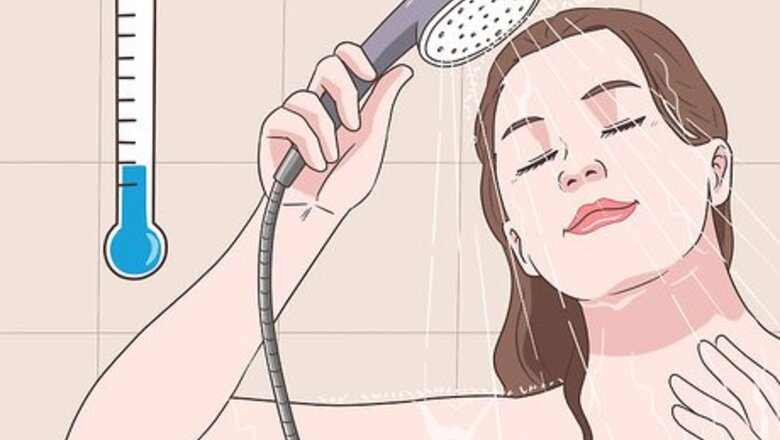
views
Relieving Symptoms at Home
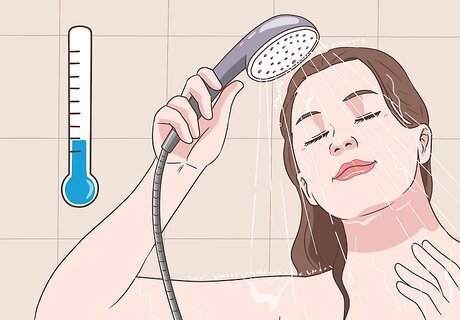
Take a cold shower the moment that you realize you have a chigger bite. A cold shower may sound unpleasant, but it can help reduce the inflammation caused by chigger bites. This helps relieve itching! Scrub your body with soap to remove any additional chiggers, as well as any digestive enzymes from a bite that may linger on the surface of your skin. Repeat your lathering and rinsing routine a few times. This will help kill most of the attached chiggers. If you don't want to take a shower, you could instead take a cold bath or apply a cold compress, though this is not as effective for removing chiggers or digestive enzymes. If you take a bath, you can add a few scoops of colloidal oatmeal to help ease your itching.
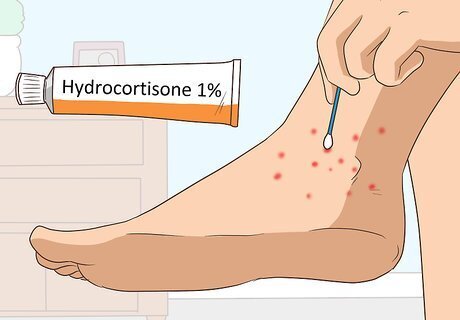
Apply hydrocortisone cream to relieve the itching. You can buy 1% hydrocortisone cream over-the-counter. Dab the cream on the bite only, not the surrounding skin. Use as little cream as possible. Ask your doctor before using hydrocortisone cream on a child under the age of 12 or if you're pregnant or nursing. You can reapply the cream every 4-6 hours, as needed.
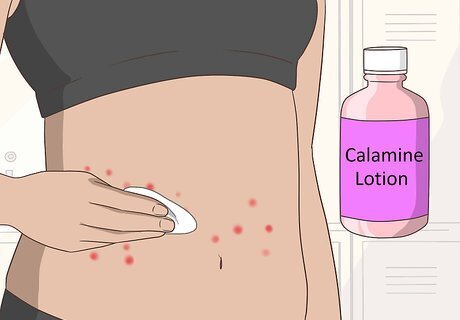
Use calamine lotion as an alternative to hydrocortisone cream. Calamine lotion can also relieve itching from chigger bites. Shake the lotion bottle, then apply a dollop of lotion to a cotton pad. Dab the lotion onto your bite, and allow it to dry before putting clothing on over the affected area. Talk to your doctor before using calamine lotion on children under the age of 12 or if you're pregnant or nursing. You can reapply calamine lotion every 4 hours, as needed.

Take an antihistamine to reduce itching and inflammation. Diphenhydramine (Benadryl) is an excellent choice, but you can also choose a non-drowsy option like cetirizine (Zyrtec) or loratadine (Claritin). This will reduce your body's reaction to the chigger bite, which can relieve itching and swelling. Talk to your doctor before taking an antihistamine, especially if you're taking other medications. Follow all dosage instructions on the packaging. Keep in mind that some antihistamines can be taken every 4 hours, while others are taken once a day. When taking an antihistamine, you may experience drowsiness.
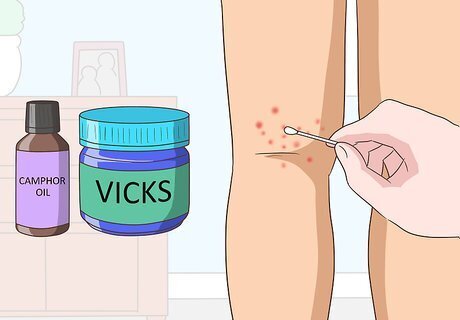
Apply camphor oil as an alternative for itch relief. Camphor oil is easy to find in your local drugstore. You can even use Vicks Vaporub, as camphor is the active ingredient! Simply dab it onto your bites to relieve the itching. If you have sensitive skin, though, camphor may irritate it. If that's the case, it may be best to stick with another remedy. You can reapply it several times a day, as needed.
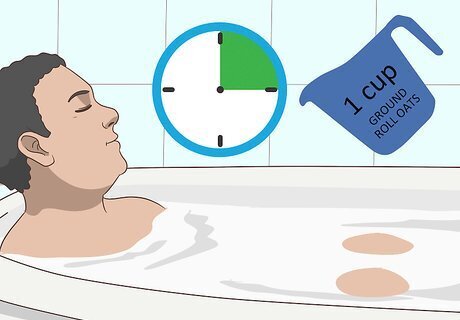
Soak in an oatmeal bath to reduce itching. Add 1 cup (85 g) of ground rolled oats or colloidal oatmeal to a warm bath. Soak for 15 minutes, then rinse off your skin. Do not bathe longer than 15 minutes or take more than 1 oatmeal bath a day, as this can dry out your skin. Dry skin will increase the itching. You can find colloidal oatmeal for bathing at your local drug store or online. Alternatively, you could grind up old-fashioned rolled oats to use in your bath.

Use a baking soda paste to relieve itching. Baking soda is another alternative for itch relief. Pour the baking soda into a clean bowl. Then pour a small amount of water onto it, stirring to form a thick paste. Add more baking soda or water as needed to reach a paste consistency. Apply the paste to your bites and allow it to dry before washing it off. You don't need to measure the baking soda. All that matters is that you have enough paste to cover your bites.
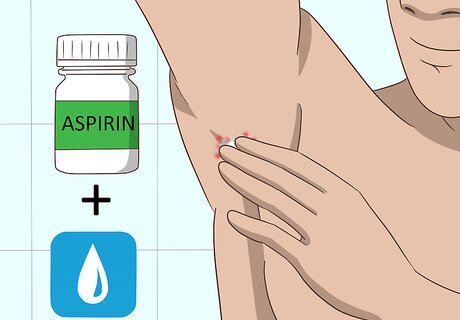
Hold a wet aspirin against the bite as an alternative to other treatments. The aspirin may reduce your pain, itching, and swelling. However, it must be wet to work. You can also grind up the aspirin and add a bit of water to make a paste. Apply the paste to your bites and let it dry before washing it off.
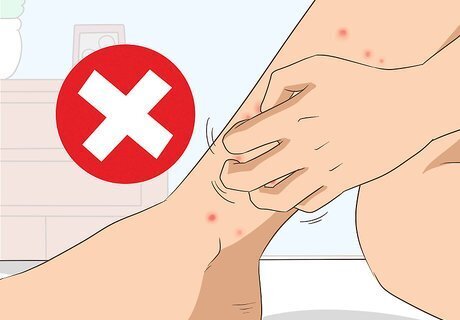
Avoid scratching, which can lead to infection. Scratching the bite can break the skin, potentially causing an infection. Not only that, it won't relieve your itching! Trim your fingernails closely if you're struggling to stop scratching the bite. You can paint over your bite with clear nail polish or school glue to prevent you from scratching. If you do break the skin, then apply an antiseptic ointment to prevent infection.
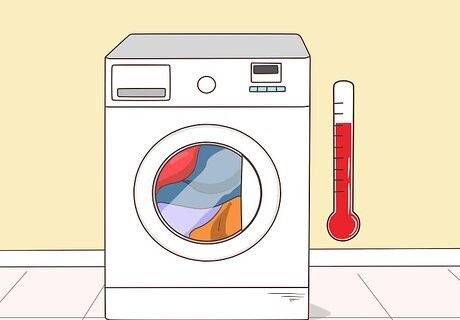
Wash the clothes you were wearing in hot water. The chiggers may also still be in your clothes, which could result in more bites! As soon as you know you encountered chiggers, wash your clothes in hot water and detergent. This will kill the chiggers and minimize the chances of them spreading.
Seeking Medical Treatment
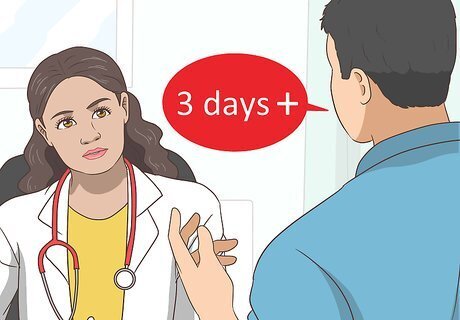
Talk to your doctor if symptoms do not improve after 3 days. It's normal for the itch to worsen in the day or 2 after the bite occurs, but it should start to improve by day 3. If symptoms do not improve or you notice additional swelling, pain, or pus, then it's best to see a doctor. In some cases, your doctor may be able to give you steroid shots to treat extreme itching and swelling.

Visit a doctor if you notice signs of infection. Chigger bites rarely become infected, but they sometimes do. Usually an infection results from scratching the bites, which can break the skin. If this happens, the doctor can prescribe an antibiotic to treat the infection. Symptoms to watch out for include: Fever Flu-like symptoms Swollen glands Redness Swelling Pus Pain
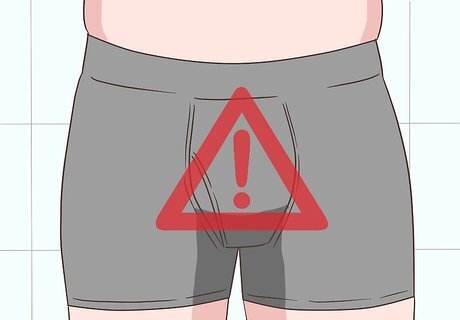
See your doctor if you have symptoms of “summer penile syndrome.” If the chiggers bit you in your groin area, you may have swelling and itching around your penis. You may also have trouble relieving yourself. If this happens, you need to see your doctor. The doctor can help relieve your symptoms and prevent complications. This condition can last for a few days to a few weeks, so it's best to get treatment as soon as possible for the best outcome.
Recognizing Chigger Bites
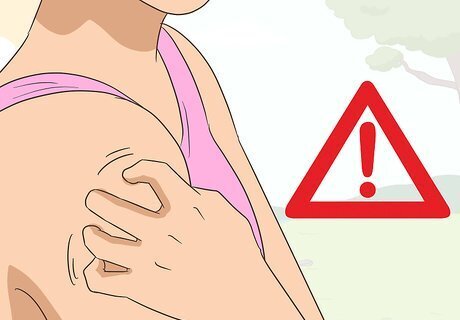
Notice extreme itching. You may experience itching before you even know you've been bitten. This is because the bite won't appear on your skin for a few hours. Scratching is often the first indication that you've suffered a bite. With chiggers, the worst itching occurs about 1-2 days after the bite.
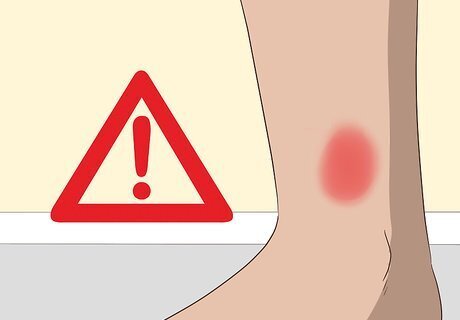
Look for a red welt that develops about 1-3 hours after the bite occurs. The welt could be flat or raised. Sometimes you may develop a pustule or blister, but this is not always the case.
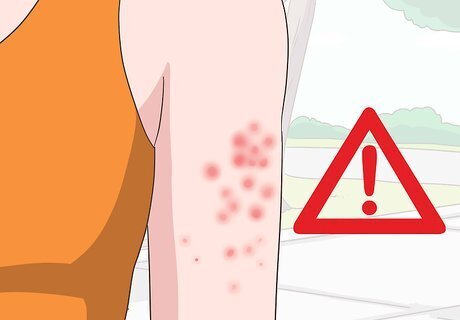
Look for a cluster of bites. It's easy to mistake chigger bites for a rash or skin condition because they'll often appear in a cluster. However, this is normal with chigger bites, especially after spending extended time outdoors.
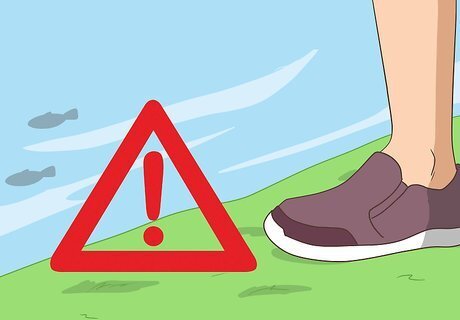
Consider if you've spent time outdoors. Most chigger bites occur after you encounter a cluster of chigger larvae, which need to attach to a host. Unfortunately, humans make great hosts! These tiny pests are common in grassy areas or near waterways. They are most prevalent in late spring through early fall.
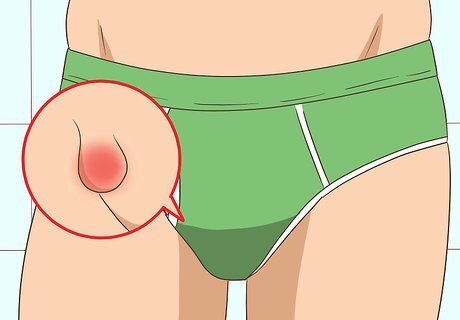
Watch for swelling in your groin area. Unfortunately, chiggers like to bite in the groin area because the skin is easier to bite. In some cases, this can cause “summer penile syndrome,” which results in itching, swelling, and trouble peeing. Symptoms can last for a few days to a few weeks.












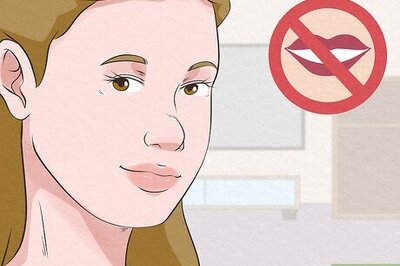


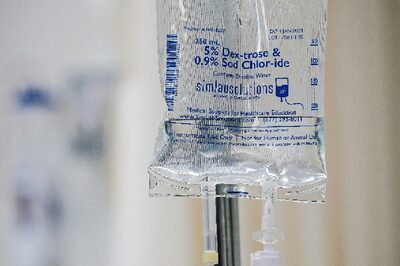




Comments
0 comment